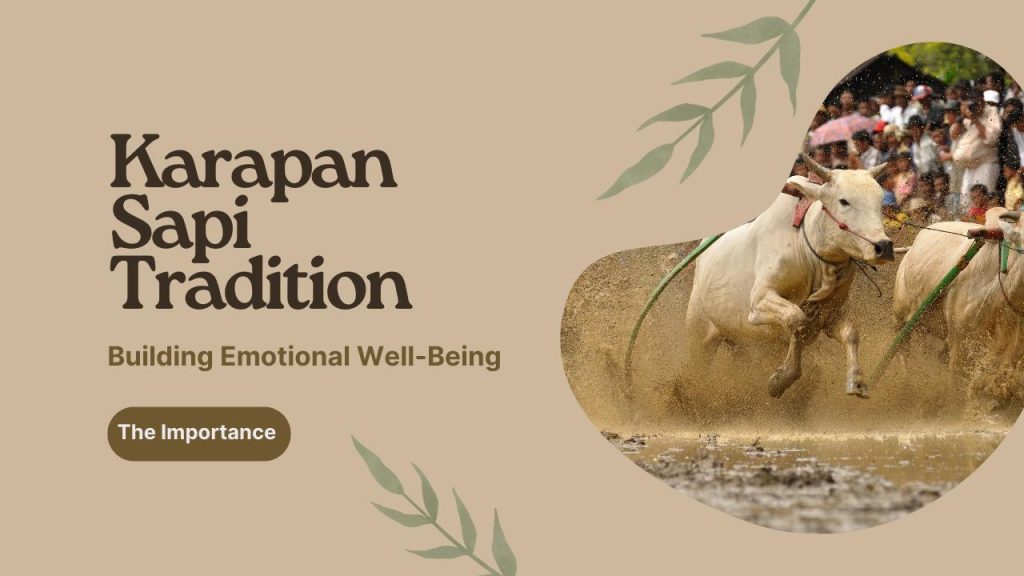Karapan Sapi Tradition in Building Emotional

Mental health is a crucial aspect of human life that is often overlooked. Amidst the hustle and bustle of daily routines and pressures, finding ways to maintain mental balance is essential. One interesting and enjoyable way to support mental health is through cultural traditions, such as the Karapan Sapi in Madura.
What is Karapan Sapi?
Karapan Sapi is a traditional bull racing competition that is characteristic of Madura Island. The origins of this tradition date back to the 15th century when Prince Katandur from the Sumenep Palace utilized the strength of bulls for plowing rice fields. The heavy and tiring work of farming was complemented by racing the bulls, providing entertainment for the farmers. From this, Karapan Sapi emerged as a combination of performance, fun, and efforts to improve livestock health.
The Positive Impact of Karapan Sapi on Mental Health
Karapan Sapi is not just a race; it also serves as a recreational outlet and hobby for many, especially for cattle breeders. Through this activity, participants can relieve stress and boredom from their daily routines. Watching the vibrant and competitive races brings joy, especially when their beloved bulls win. This can boost the owner’s confidence and pride, which are essential elements in maintaining mental health.
As expressed by Mr. Deni, a cattle breeder with two bulls he plans to enter in the competition, he sees Karapan Sapi as a form of entertainment that not only alleviates fatigue but also instills a sense of pride and achievement when his bull wins. “I feel a sense of joy and excitement whenever my bull claims victory and stands on the podium,” he expressed. This highlights the significance of such activities for individual emotional well-being.
The Connection Between Culture and Mental Health
Mental health is significantly influenced by social and cultural factors. A positive social environment can provide strong support for individuals, while supportive cultures can help reduce stigma surrounding mental health issues. In the context of Karapan Sapi, this activity fosters positive social interactions among breeders, spectators, and the community. Engaging in this tradition enhances a sense of connection, which is crucial for maintaining mental health.
Research indicates that participation in cultural activities can reduce symptoms of anxiety and depression. In this sense, Karapan Sapi acts as an effective means of building social networks and strengthening interpersonal bonds. By watching and participating in Karapan Sapi, people can support one another, share experiences, and celebrate each other’s successes.
Preserving Traditions for Mental Health
Given the significant benefits of Karapan Sapi for mental health, it is vital for the younger generation to preserve this tradition. Besides being a source of entertainment, Karapan Sapi also plays a role in reinforcing the cultural identity of the Madurese people. With annual events such as the presidential trophy held every October, Karapan Sapi attracts the attention of many tourists. This not only helps promote local culture but also has a positive impact on the mental health of the community.
Through the preservation of this tradition, the younger generation can learn about cultural values and the importance of maintaining emotional well-being. They will be encouraged to participate in activities that support mental health while preserving a cultural heritage that has existed for generations.
Conclusion
Mental health is an aspect that cannot be neglected, and finding ways to maintain it is crucial. The Karapan Sapi tradition in Madura exemplifies how culture can positively contribute to individual mental health. By preserving this tradition, we not only safeguard cultural identity but also support the emotional well-being of the community. Let us support beneficial activities like this and continue to foster healthy social relationships for the collective mental well-being



0 Comment
I’m not sure exactly why but this blog is loading extremely slow for me. Is anyone else having this problem or is it a issue on my end? I’ll check back later on and see if the problem still exists.